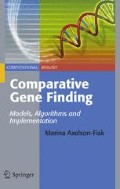Abstract
In this chapter we exemplify the implementation of a gene finder by describing the software SLAM in a little more detail. SLAM is a cross-species gene finder particularly adapted to eukaryotes, and works by simultaneously aligning and annotating two homologous sequences. The basic framework of SLAM is a generalized pair hidden Markov model, which is a seamless merging of pair hidden Markov models typically used for pairwise alignments, and generalized hidden Markov models that have been successfully implemented in several single species gene finders. We begin by detailing the structure of the program and continue by going into some of the algorithmic details of the algorithms. We finish by describing various measures used to assess the accuracy of gene finding softwares. The main purpose of such measures is not only to detect problems with the algorithms during development, but to be able to benchmark the software against other methods.
Access this chapter
Tax calculation will be finalised at checkout
Purchases are for personal use only
Preview
Unable to display preview. Download preview PDF.
References
Alexandersson, M., Cawley, S., Pachter, L.: SLAM: cross-species gene finding and alignment with a generalized pair hidden Markov model. Genome Res. 13, 496–502 (2003)
Bray, N., Dubchak, I., Pachter, L.: AVID: a global alignment program. Genome Res. 13, 97–102 (2003)
Burge, C., Karlin, S.: Prediction of complete gene structures in human genomic DNA. J. Mol. Biol. 268, 78–94 (1997)
Dewey, C., Wu, J.Q., Cawley, S., Alexandersson, M., Gibbs, R., Pachter, L.: Accurate identification of novel human genes through simultaneous gene prediction in human, mouse, and rat. Genome Res. 14, 661–664 (2004)
Mouse Genome Sequencing Consortium: Initial sequencing and comparative analysis of the mouse genome. Nature 420, 520–562 (2002)
Rat Genome Sequencing Consortium: Genome sequence of the Brown Norway rat yields insights into mammalian evolution. Nature 428, 493–521 (2004)
Smit, A.F.A., Hubley, R., Green, P.: RepeatMasker at http:www.repeatmasker.org
Author information
Authors and Affiliations
Corresponding author
Rights and permissions
Copyright information
© 2010 Springer-Verlag London
About this chapter
Cite this chapter
Axelson-Fisk, M. (2010). Implementation of a Comparative Gene Finder. In: Comparative Gene Finding. Computational Biology, vol 11. Springer, London. https://doi.org/10.1007/978-1-84996-104-2_7
Download citation
DOI: https://doi.org/10.1007/978-1-84996-104-2_7
Published:
Publisher Name: Springer, London
Print ISBN: 978-1-84996-103-5
Online ISBN: 978-1-84996-104-2
eBook Packages: Computer ScienceComputer Science (R0)

